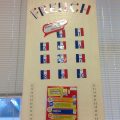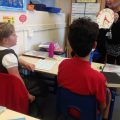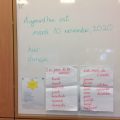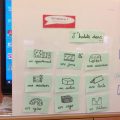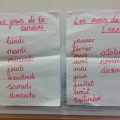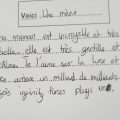“Learning French is fantastic, as it gives me the chance to speak to my cousins who speak French.” Zoe
“I really enjoy French because it’s a different language and I can see how the words are related.” Sophia V
French is good fun and really useful for when we go on holiday.” George
At Manland, we teach French as our chosen Modern Foreign Language. We develop pupil’s speaking, listening and understanding skills through the use of the Salut! scheme of work to teach children in Years 3 to 6. The teaching in Key Stage 2 is progressive and is built upon each year, supported by the guidance material within the ‘Salut’ scheme of work.
Teachers use a variety of techniques enabling pupils to have an active engagement within their modern foreign language lessons. This includes games, role-play and action songs. Lessons include introductions to key vocabulary for each lesson, flashcards to support learning, as well as games and songs to reinforce the learning objective. The ‘Salut’ scheme is organised into units of work; three core units, followed by multiple units which cover children’s day-to-day routines, as well as their interests and home life.
At Manland, we look to extend our language learning wherever possible. For example, by asking children to share the languages which they speak at home. We have also enjoyed extra French lessons, from local Secondary school students, who have been able to come and teach small groups of children.
Our Aims – Modern Foreign Languages National Curriculum
The National Curriculum for modern foreign languages aims to ensure that all pupils should be taught to:
- Listen attentively to spoken language and show understanding by joining in and responding
- Explore the patterns and sounds of language through songs and rhymes and link the spelling, sound and meaning of words
- Engage in conversations; ask and answer questions; express opinions and respond to those of others; seek clarification and help
- Speak in sentences, using familiar vocabulary, phrases and basic language structures
- Develop accurate pronunciation and intonation so that others understand when they are reading aloud or using familiar words and phrases
- Present ideas and information orally to a range of audiences
- Read carefully and show understanding of words, phrases and simple writing
- Appreciate stories, songs, poems and rhymes in the language
- Broaden their vocabulary and develop their ability to understand new words that are introduced into familiar written material, including through using a dictionary
- Write phrases from memory, and adapt these to create new sentences, to express ideas clearly
- Describe people, places, things and actions orally and in writing
- Understand basic grammar appropriate to the language being studied, including feminine, masculine and neuter forms and the conjugation of high-frequency verbs; key features and patterns of the language; how to apply these, for instance, to build sentences; and how these differ from or are similar to English
Ways to Develop Modern Foreign Languages Skills at Home
- If you can speak in a different language, celebrate and share this with your children at home
- Read or listen to story books in different languages
- Ask your child to tell you how many words they know in a different language.
- Encourage your child to count in other languages.
- Ask them if they can say a sentence to you in French based on their lessons or can they ask you a question in a different language?
- Ask children to talk about things they like and then see if you can research and find the words for them in different languages e.g. animals or sports.
- Play educational language games online, for example, https://www.bbc.co.uk/bitesize/subjects/z39d7ty




